Eine Fallstudie aus der Versicherungsbranche - Compass für das Management von Agenturen
Eine interessante Fallstudie über die Implementierung von Compass und die Ergebnisse für einen der führenden Versicherungsanbieter in Indien.
Auf dieser Seite
Über das Unternehmen
Unser Kunde ist eines der besten allgemeinen Versicherungsunternehmen in Asien und erhielt 2001 die Zulassungsbescheinigung der Insurance Regulatory and Development Authority (IRDA). Das Unternehmen ist bekannt für seinen hervorragenden Kundenservice und seine Innovationen im Versicherungsbereich. Im Laufe der Jahre hat das Unternehmen kontinuierlich Gewinne erwirtschaftet. Heute verfügt das Unternehmen über ein landesweites Netz in über 200 Städten von Surat bis Siliguri und von Jammu bis Thiruvananthapuram. Der Hauptsitz des Unternehmens befindet sich in Pune.
Problemstellung
Anzahl der Mitarbeiter: 800
Niveaus: Teamleiter (Stufe 1) und FOS (Stufe 2)
Die hauptamtlichen Versicherungsvertreter des Unternehmens (FOS - Feet On Street - genannt) haben folgende Aufgaben zu erfüllen: Verkauf von Kfz-Versicherungen, Verlängerungen und Prämieneinzug. Das FOS-Team spricht potenzielle Versicherungskäufer in ihrem Gebiet an, um ihnen eine Kfz-Versicherung anzubieten. Wenn der Käufer eine Kfz-Versicherung abschließt, spricht man von einem "Policenverkauf" (ausgedrückt als Anzahl der verkauften Policen). Wenn ein Käufer seine Versicherungspolice erneuert, spricht man von einer "Erneuerung" (ausgedrückt als "Ja"- oder "Nein"-Eintrag). Die Gesamtprämie, die der FOS eingenommen hat, wird als "eingenommene Nettoprämie" bezeichnet.
Es gibt zwar monatliche Berichte über verkaufte Policen, Verlängerungen und eingenommene Nettoprämien, die an das FOS-Team und seine Teamleiter verschickt werden, aber sie müssen einen Antrag stellen, um eine Aktualisierung dieser Zahlen und damit der ihnen zustehenden Provision zu erhalten. Es dauert durchschnittlich einen Tag, bis dieser Bericht bei ihnen oder ihrem Vorgesetzten eintrifft.
Das Unternehmen wollte, dass diese Leistungsdaten für sein FOS-Team transparenter und leichter zugänglich sind. Außerdem wollte es diese Daten nutzen, um das Team zu besseren Leistungen anzuspornen und die Leistungsträger anzuerkennen.
Lösung
Entwurf der Kommission
Die Funktionen von Compass Program Design, User Management und Data Sources & Variables wurden verwendet, um die unten angegebene Provisionslogik zu erstellen.
Vorbedingungen:
Die FOS haben nur dann Anspruch auf die Provision, wenn die folgenden Bedingungen erfüllt sind:
- Mindestens 40 % der monatlichen Nettoprämienquote werden eingenommen.
- Der Verkauf neuer Policen sollte 50 % des Ziels betragen.
- Die Zielerreichung bei der Erneuerung sollte mindestens 50 % betragen.
Bedingte Kommissionstafeln
1. Bedingungen für die Erreichung:
Bei 6 - 9 privaten Autopolicen: Die Provision wird berechnet als Rs. 250 * Anzahl der verkauften Policen
Bei 10 -12 privaten Autopolicen: Die Provision wird berechnet als Rs. 300 * Anzahl der verkauften Policen
Bei 13 - 19 privaten Autopolicen: Die Provision wird berechnet als Rs. 400 * Anzahl der verkauften Policen
Bei >19 privaten Kfz-Policen: Die Provision wird berechnet als Rs. 500 * Anzahl der verkauften Policen
2. Nudge-Bedingungen:
Ziel Meilenstein weise Stupse für:
Kumulative Politik Verkauf Meilensteine: 6, 10, 13, 19
Häufigkeit: Wöchentlich
Medium: E-Mail, SMS und Push-Benachrichtigungen auf der Compass
Warnung vor Leistungseinbußen
FOS, die über einen Zeitraum von zwei Monaten nicht mindestens 75 % ihres Meilensteinziels und 25 % ihres Nettoprämienziels erreicht haben, erhalten eine Leistungswarnung mit der Aufforderung, ihre Leistung zu verbessern - auf diese Weise können sie proaktiv an der Verbesserung ihrer Leistung arbeiten. (Bei anhaltenden Leistungsproblemen werden sie in der Regel getrennt).
App-Einrichtung
- Markenanpassung der Endbenutzer-App
- Konfigurieren Sie die folgenden Provisionsberechnungen für die FOS-Incentive-Programme
- Administratorschulung für Kunden-POCs
Kommunikation
Die Compass wurde verwendet, um Teamnachrichten zu versenden, die Folgendes enthielten:
- Performance-Hacks
- Achiever-Ankündigungen
- Tipps und Erfahrungsberichte von Künstlern
- Compass Merkmalsbewusstsein
- Compass Bewusstsein für die Geldbörse
- Compass Bewusstsein für Belohnungen und Vorteile
- Compass Gruppenbewusstsein
- Compass Erlösungsbewusstsein
- Mehr Provisionen auf Compass - Hacks
- Bewusstsein "Was ist für mich drin?
- Gemeinschaftsbildende Aktivitäten mit nutzergenerierten Inhalten
Dashboard
Die Compass bot Filial- und Regionalmanagern die Möglichkeit, die unten aufgeführten Daten einzusehen:
- Regionale Ranglisten
- Wirksamkeit der Provisionsprogramme in Bezug auf die Anzahl der Qualifikanten für jedes Programm
- Kommissionsprogramm-bezogene Ranglisten
Auswirkungen
Methodik der Folgenabschätzung
Die Auswirkungen der oben genannten Umsetzung von Compass wurden anhand der folgenden Kriterien bewertet:
- Befragung von 200 Endnutzern
- Benutzerumfrageformular für 500 Endbenutzer
- Feature-Quiz für 700 Endnutzer
- Vergleich der Annahme von Performern und Non-Performern
- Vergleich der Geschäftsdaten des vorangegangenen mit dem durchgeführten Zeitraum
- Manager-Umfrage
Ergebnisse der Benutzerbefragung
Datenpunkt 1: Bekanntheit von Compass
Eine intensive Förderung von oben nach unten, TTT-Programme (Train the Trainer) und Schulungs-Webinare trugen zur Sensibilisierung bei.

Datenpunkt 2: Quelle des Bewusstseins
Die Teamleiter und das Webinar (was auf Top-Down-Messaging hinweist) tragen zu 85,7 % des Downloads im Vergleich zu Whatsapp (Grassroot-Messaging) bei.
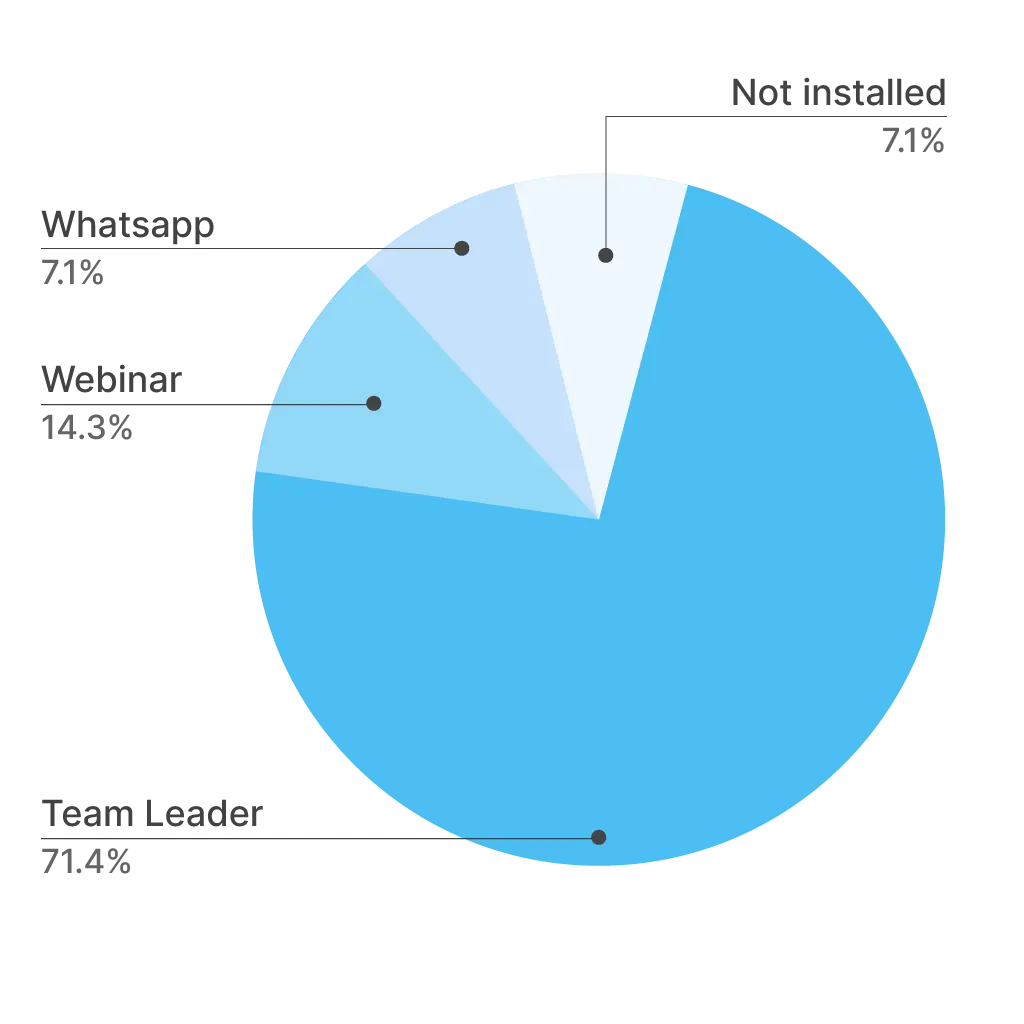
Datenpunkt 3: Compass Installationsstatus
Die erfolgreiche Sensibilisierungsinitiative führt zu einer hohen Anzahl von Downloads (92,9 %).
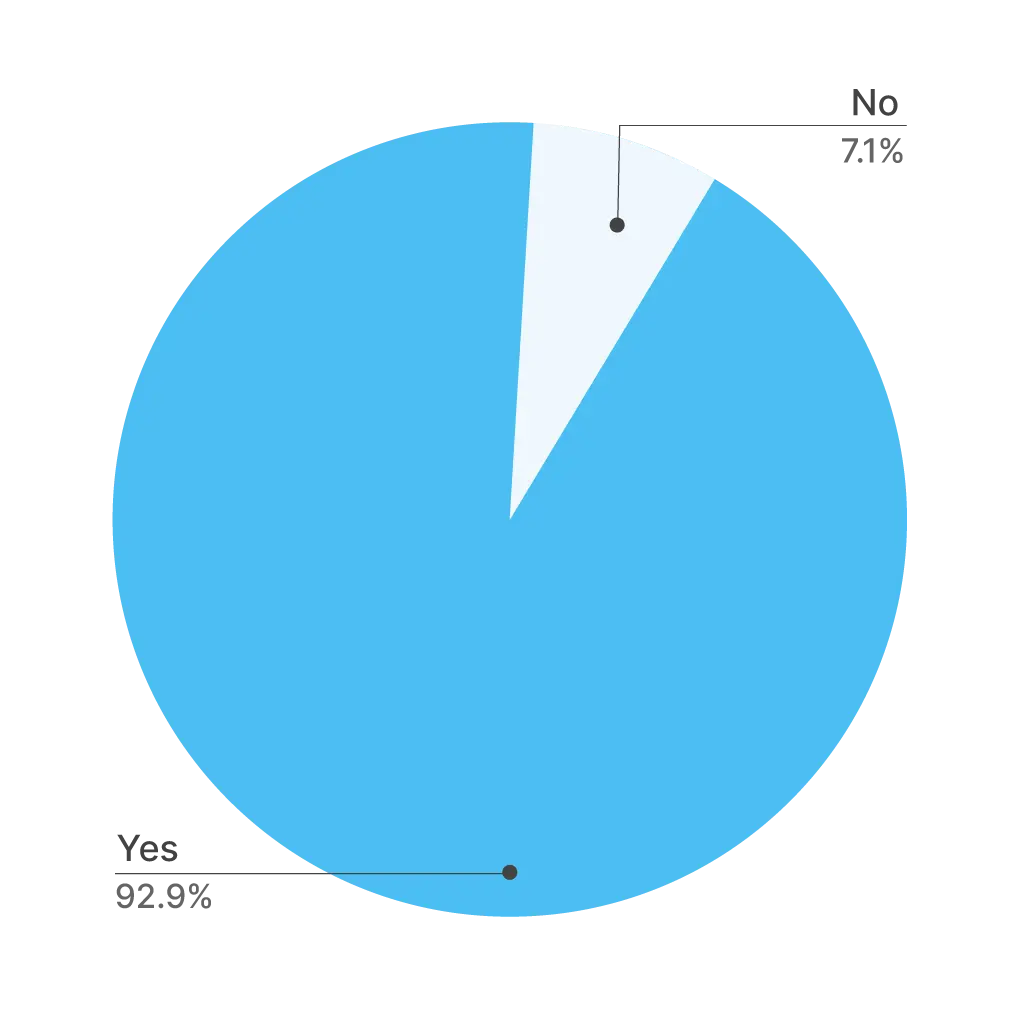
Benutzerinterview + Umfrageergebnisse
Gesamtbewertung der App nach verschiedenen wahrgenommenen Vorteilen.
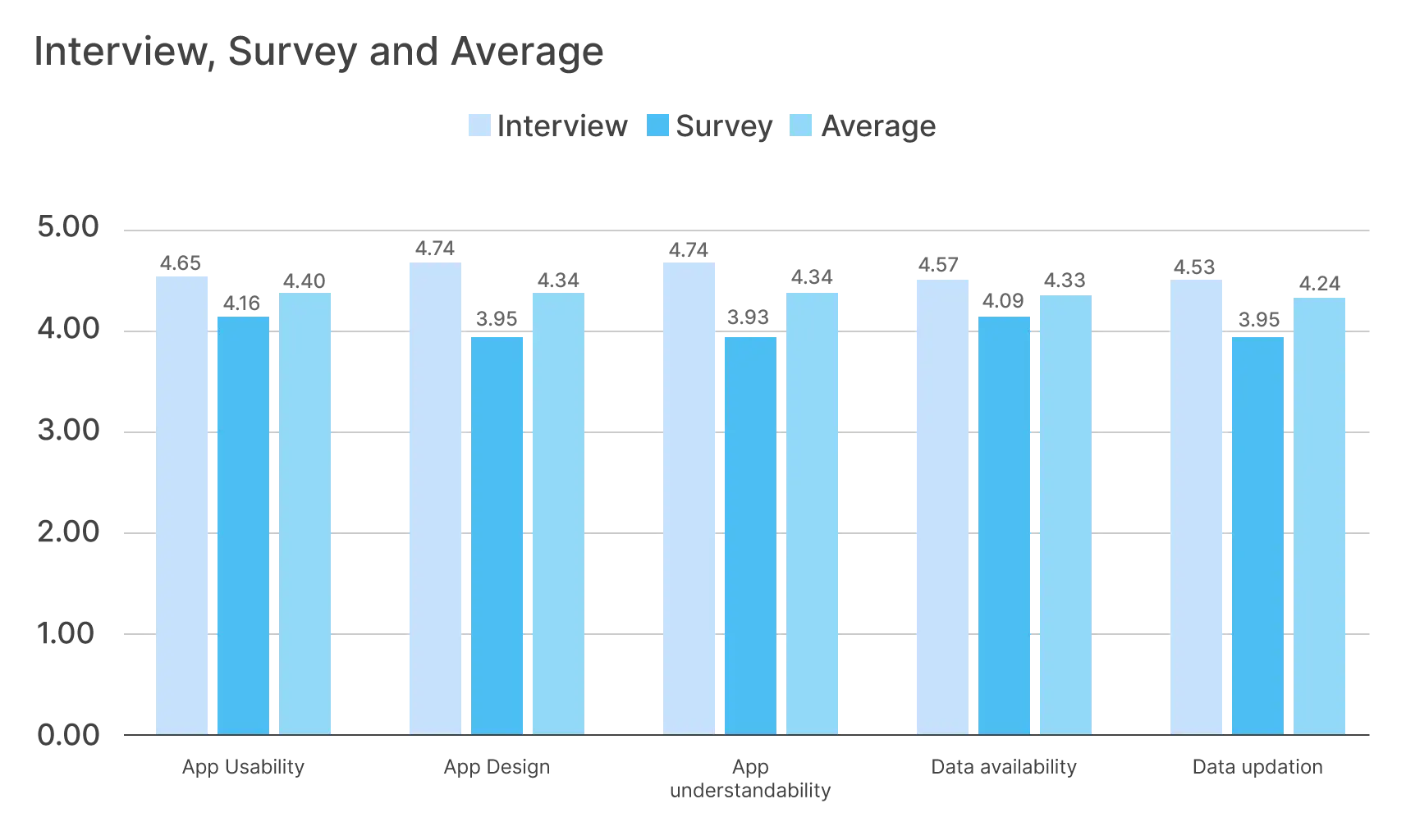
Die Nutzer wurden gebeten, die App anhand ihrer Wahrnehmung der folgenden Vorteile auf einer Bewertungsskala zu bewerten: 1 - Sehr unzufrieden, 2 - Mäßig unzufrieden, 3 - Neutral, 4 - Mäßig zufrieden, 5 - Sehr zufrieden.
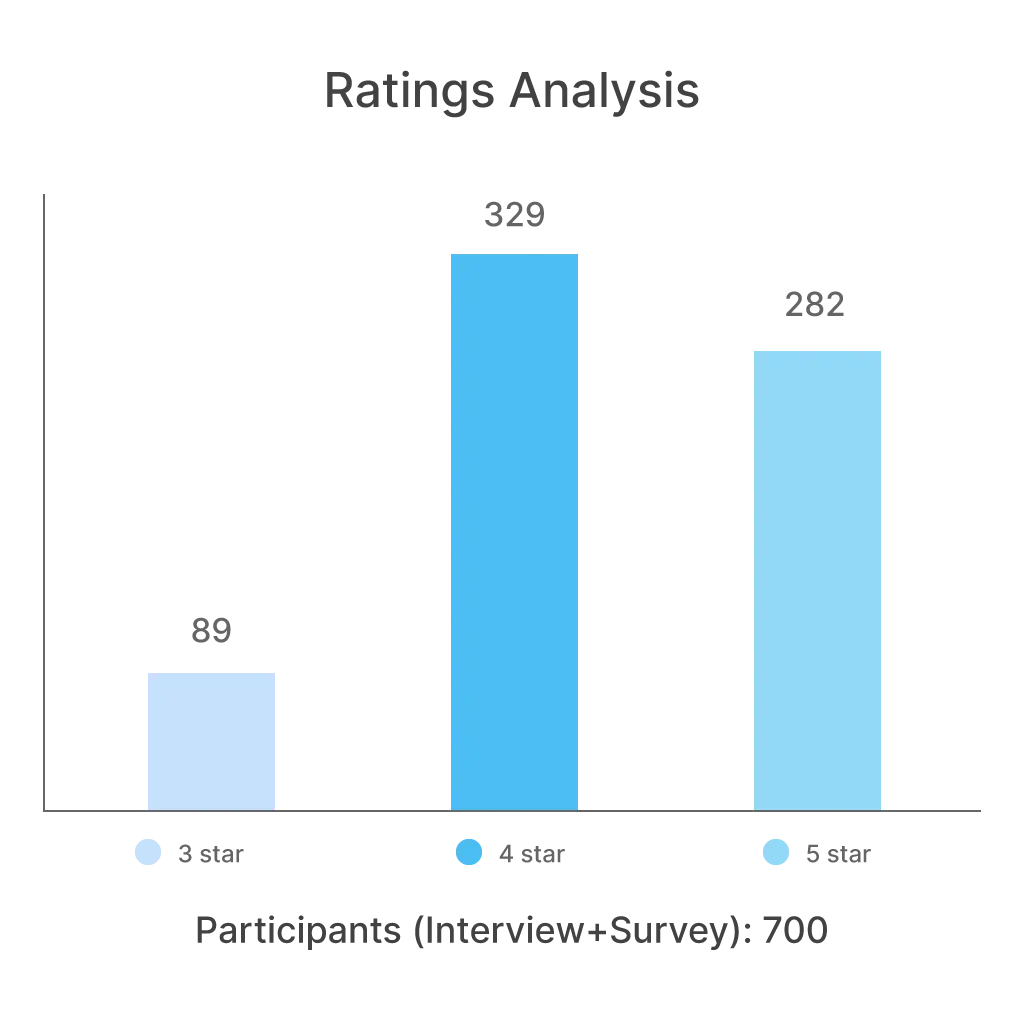
Ergebnisse der App-Annahme
Die höchste Annahmequote wurde innerhalb der ersten 15 Tage nach der Einführung erreicht.
Dies ist eine Funktion der Erinnerung, der Neugier und der hohen Frequenz der Kontaktpunkte (über Webinar, TTTs und Launch-Mailer) mit den Endverbrauchern.
Die durchschnittlichen Logins pro Woche haben sich nach 45 Tagen bei 2,2 stabilisiert.
Dies deutet darauf hin, dass die Nutzer nach den ersten zwei Wochen in der Regel zwei bis drei Mal pro Woche auf die Compass zugreifen.
Die durchschnittliche Verweildauer im Programmbereich betrug 3,17 Minuten pro Nutzer
Der Hauptzweck der Compass war die Schaffung eines Programmbewusstseins und der Zugriff auf den Leistungsfortschritt der FOS. Ein höherer Zeitaufwand für den Abschnitt Programme (3,17 Minuten) beweist, dass die Anwendung diesen Zweck erfüllt.
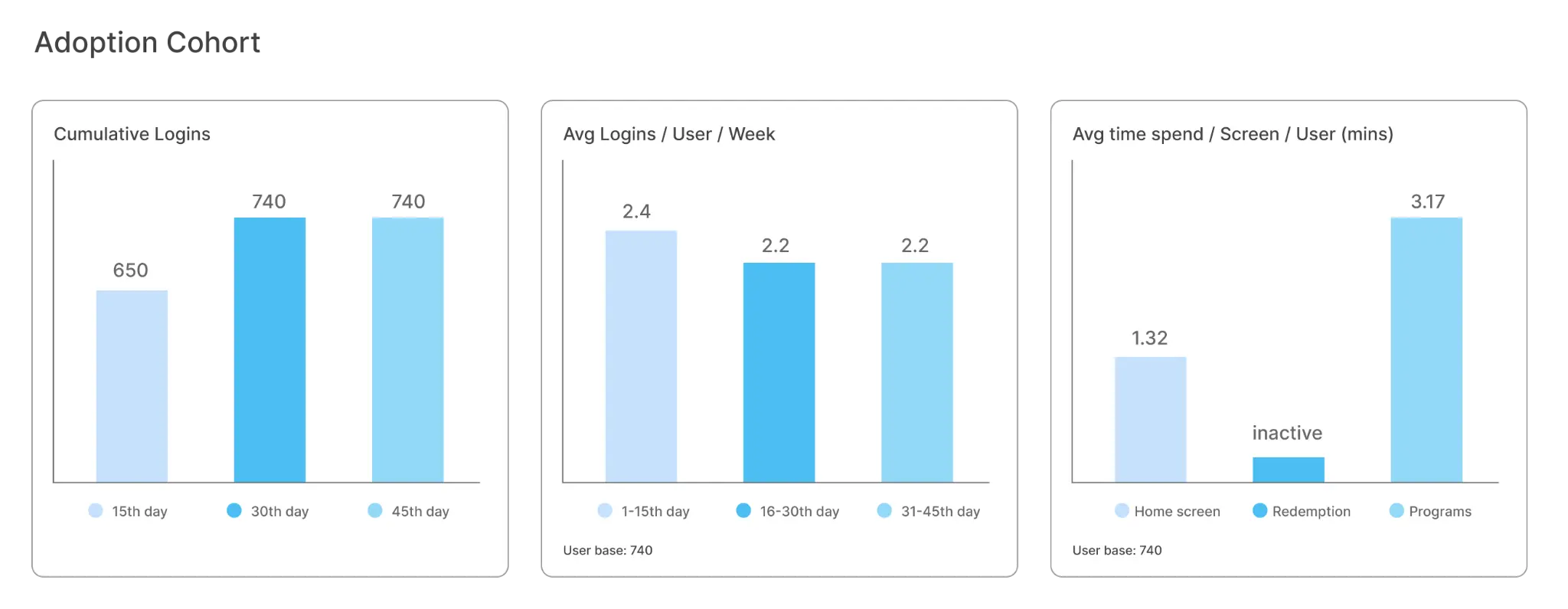
Analyse von Performern und Nicht-Performern
Um zu verstehen, wie sich die App auf die Teilnehmer auswirkt und die Leistung verbessert, wurden Gruppen von Teilnehmern und Nicht-Teilnehmern untersucht.
Es wurde festgestellt, dass sich die Performer-Kohorten häufiger einloggten (254 von 274), die Compass besser bewerteten (4,8) und die App besser verstanden und sich mehr mit ihr beschäftigt haben (die durchschnittliche Quiz-Punktzahl lag bei 29,7 von 40). Die Gesamtzahl der Ausführenden stieg im Untersuchungszeitraum (von 259 auf 379) und auch ihre durchschnittlichen Leistungen stiegen (von 206K auf 255K durchschnittliche Nettoprämie pro FOS).
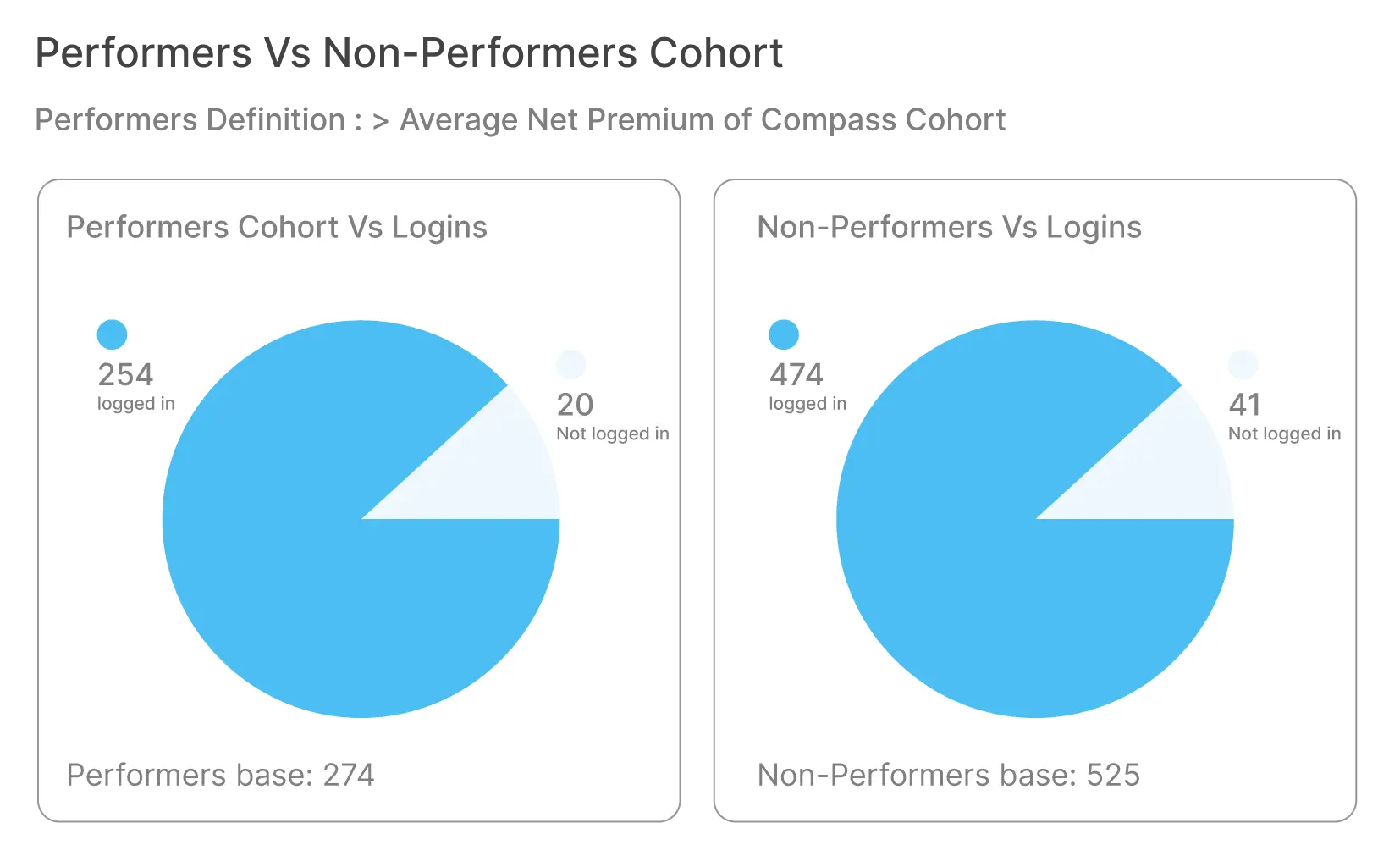

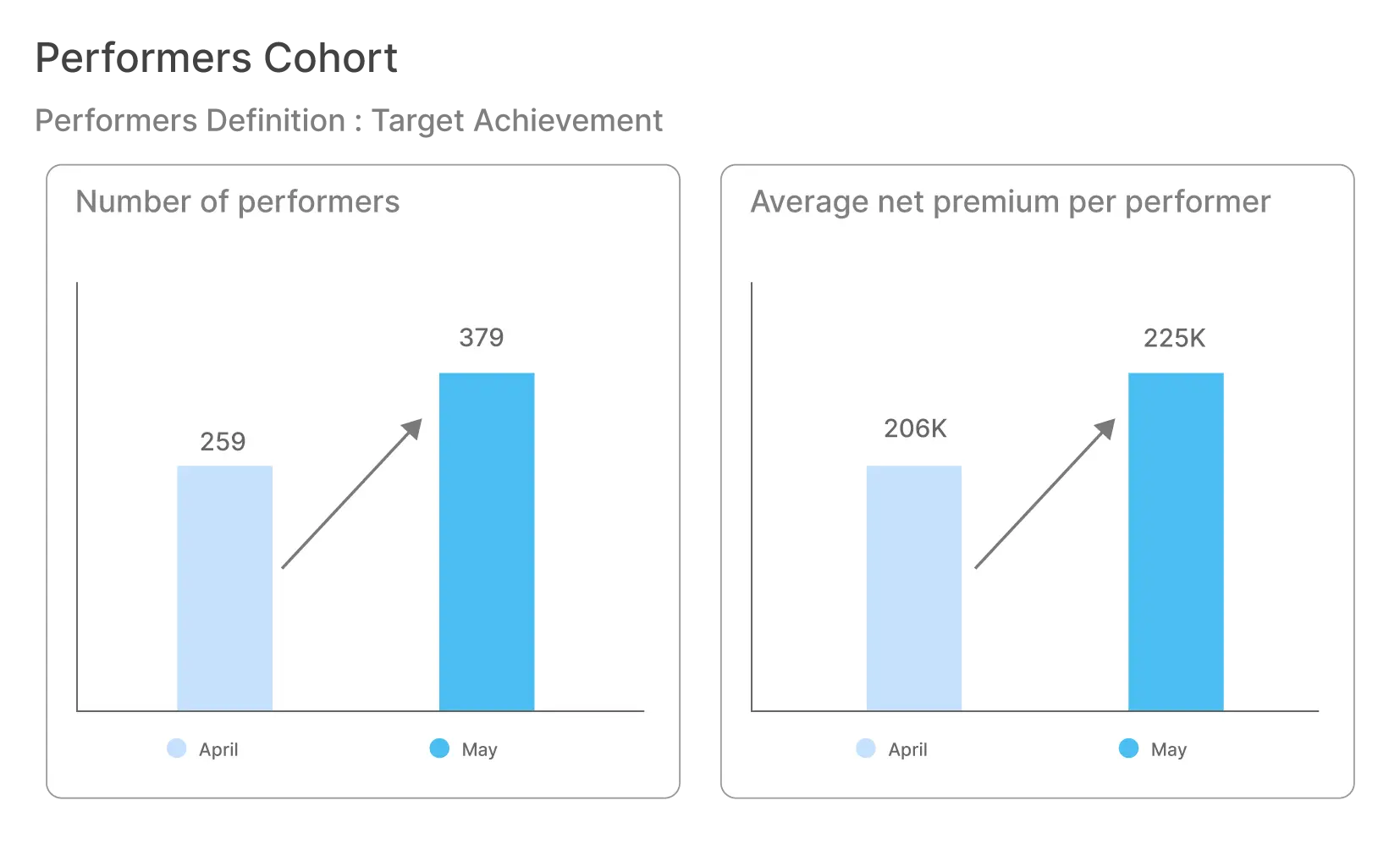
Vergleich der Geschäftsdaten (vom vorherigen Zeitraum bis zum aktuellen) zwischen der von Compass umgesetzten Kohorte und der nicht umgesetzten Kohorte
Während sowohl Compass als auch die nicht implementierten Kohorten des Teams an Leistung zulegtenCompass von 95.000 auf 129 durchschnittliche Nettoprämien pro FOS; andere von 69.000 auf 96.000 durchschnittliche Nettoprämien pro FOS), verzeichnete die Compass bis Juni ein anhaltendes WachstumCompass das Wachstum derCompass verbesserte sich von 22 % im Mai auf 27 % im Juni, das Wachstum der anderen Kohorten ging von 36 % im Mai auf 14 % im Juni zurück).
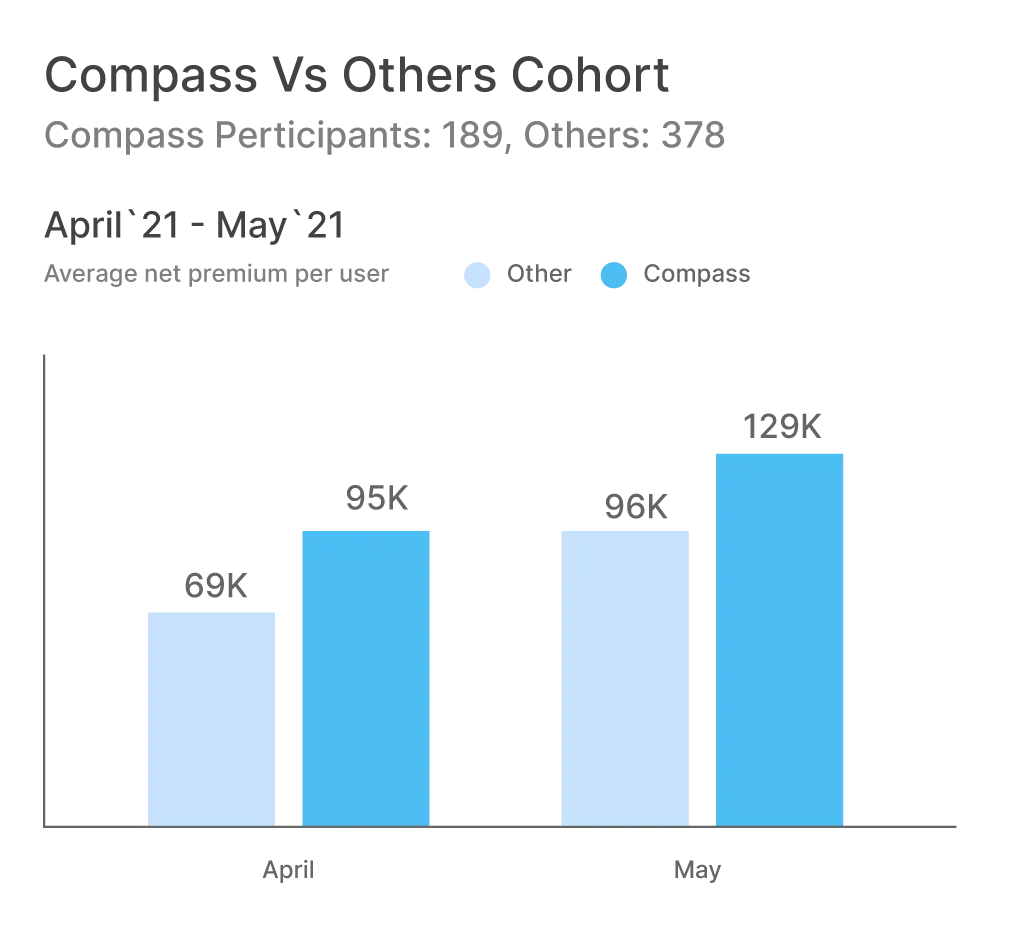
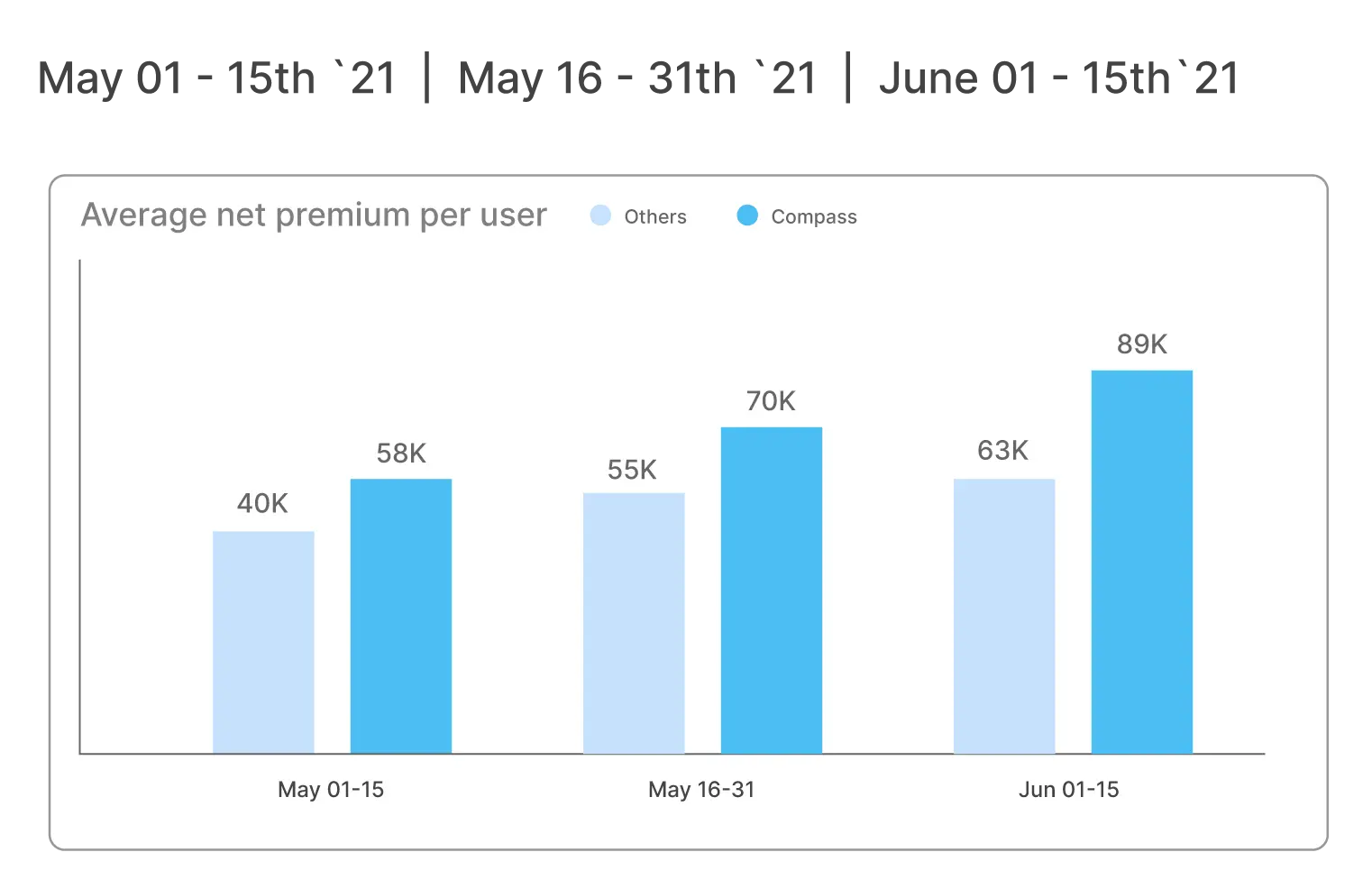
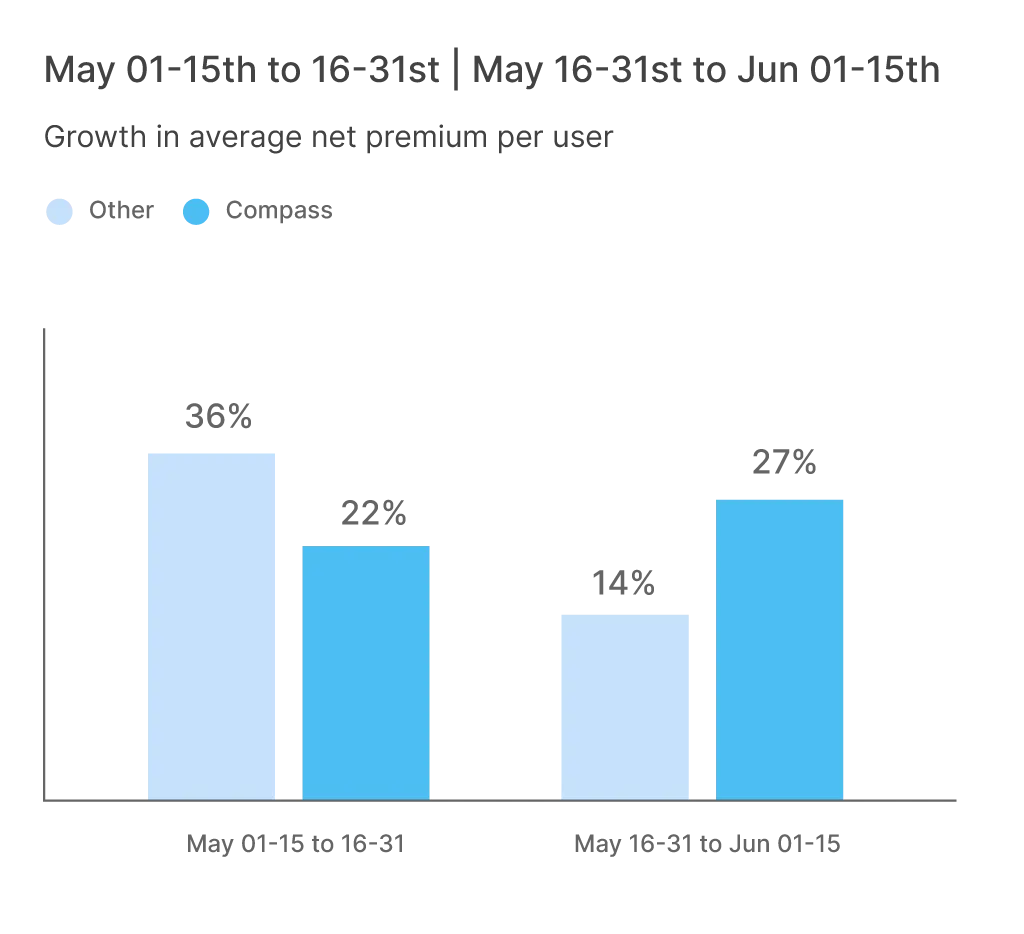
Manager-Umfrageantworten
Um die Sichtweise von Teammanagern zu verstehen, wurde eine Umfrage mit fast 50 Managern durchgeführt. Hier ist eine Momentaufnahme der Umfrageergebnisse.
Zusammenfassend lässt sich sagen, dass die Manager Compass als ein wesentliches Instrument zur Verbesserung der Leistung betrachten. Sie bewerteten Compass hoch bei Parametern* wie - Anzeige des Verdienstpotenzials (4,3/5); Live-Provisionsverfolgung (4,48/5); Anzeige von produkt- und segmentbezogenen Provisionsdetails (4,39/5); Live-Performance-Berichte (4,48/5); und Gesamtleistung des FOS (4,48/5).
*Diese Parameter wurden erst nach ausführlichen Gesprächen mit den Managern ermittelt.
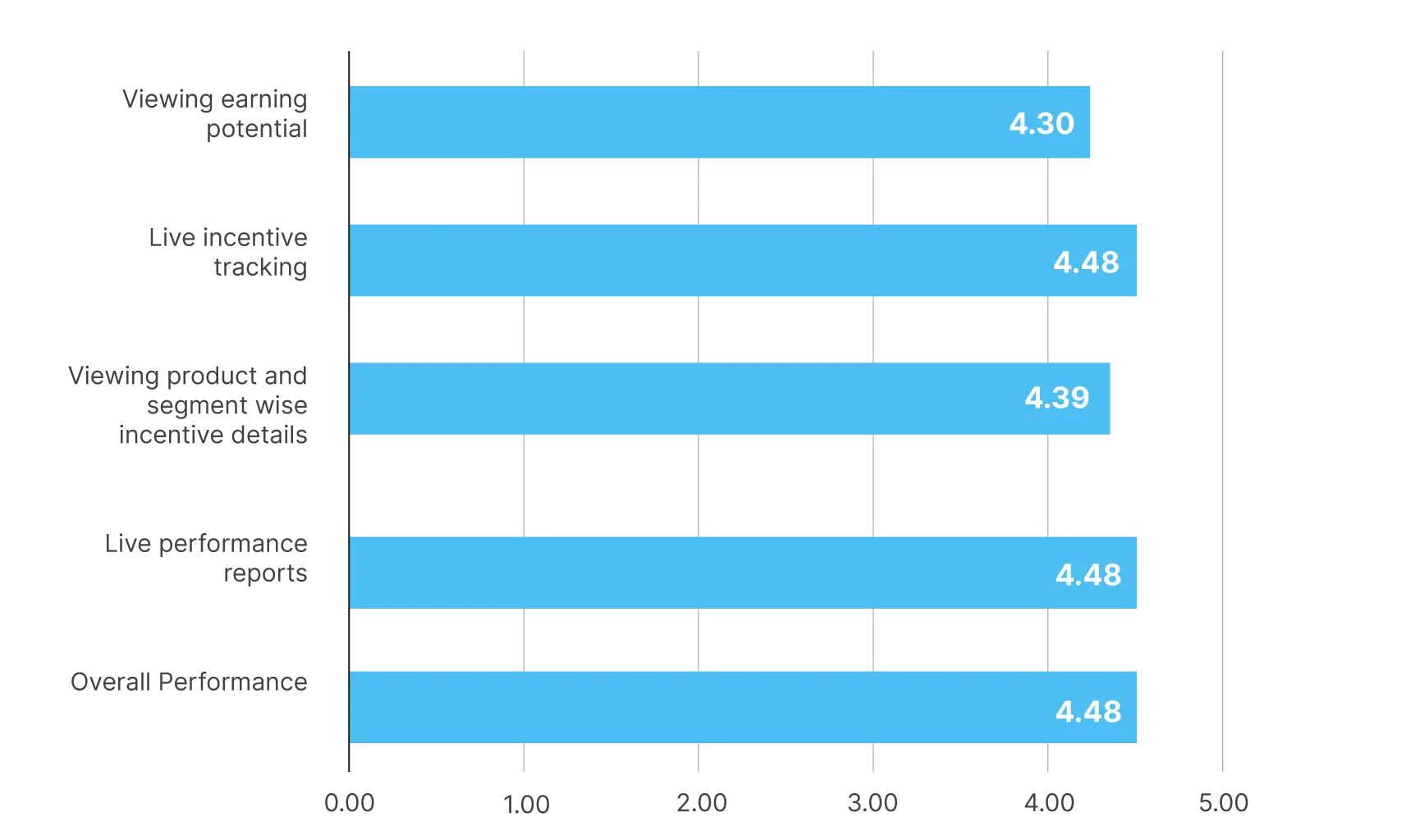
Schlussfolgerung
Im Folgenden finden Sie eine Momentaufnahme, wie die FOS Compass im Vergleich zum Compass abschneidet:
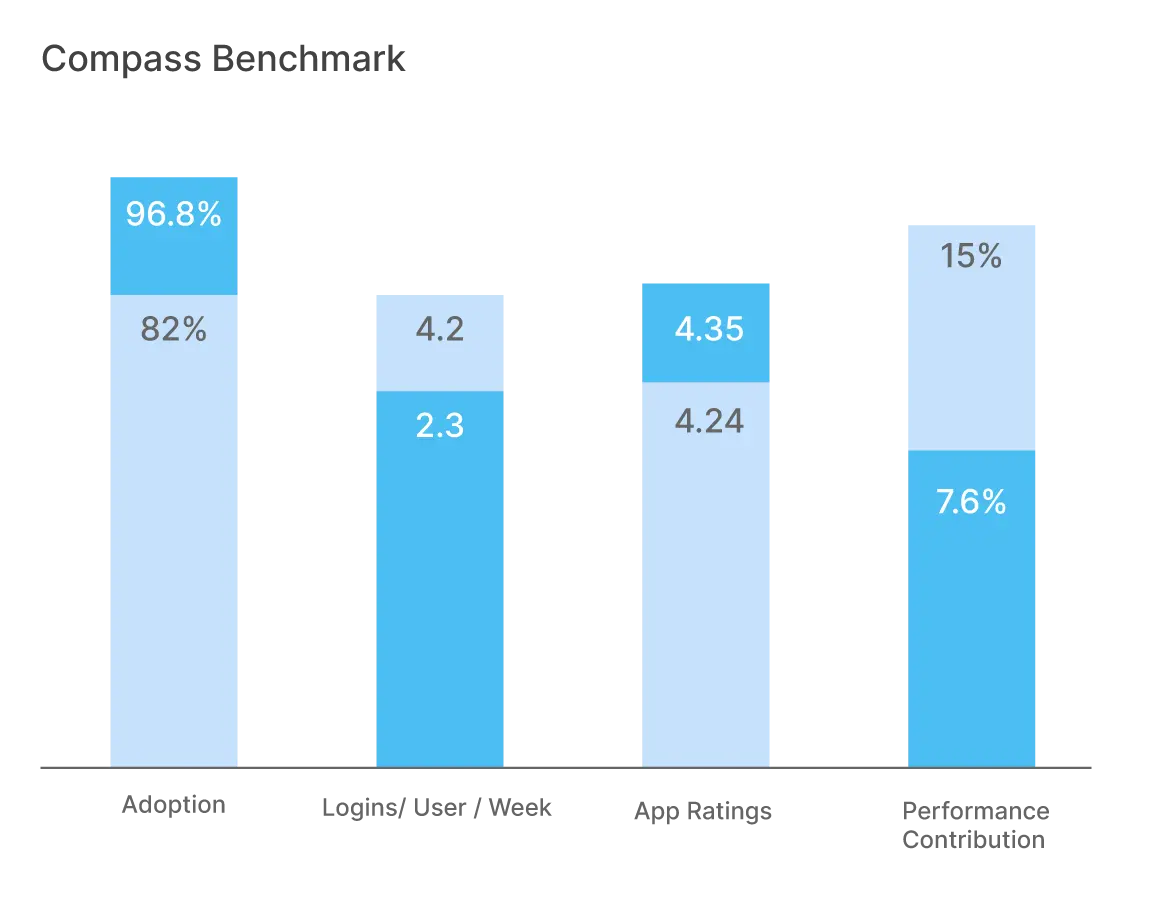
* Die Logins/Benutzer/Woche und der Performance-Beitrag sind niedriger als unsere Benchmark, weil dieser Kunde sich nur für unsere Lösung zur Provisionsberechnung und -anzeige angemeldet hat und nicht für unsere Standardlösung zur Berechnung und Einlösung von End-to-End-Provisionen.
Zum Abschluss unserer Erkenntnisse aus der FOS-Fallstudie:
- Die Compass Kohorte hat eine deutliche Leistungssteigerung gezeigt.
- Die Performer-Kohorten haben sich häufiger eingeloggt, Compass besser bewertet und die App besser verstanden und sich mehr mit ihr beschäftigt.
- Manager halten Compass für ein wichtiges Instrument zur Leistungssteigerung.















